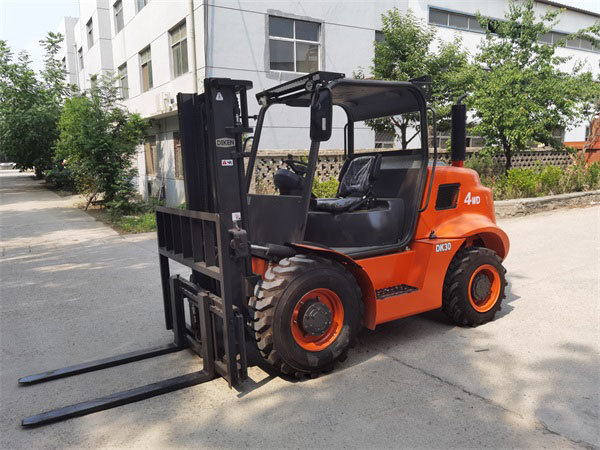Diken news
Maximizing Efficiency in Agriculture: The Benefits of All Terrain Forklifts
Release time: 2025-04-20
All terrain forklifts are specialized vehicles designed to navigate a variety of terrains, making them an ideal solution for agricultural operations. These forklifts are built with rugged tires and enhanced stability, allowing them to traverse uneven ground, mud, and even snow, which is often encountered in agricultural settings. This feature significantly improves their utility, especially in operations that involve moving heavy materials across challenging landscapes.
One of the primary advantages of all terrain forklifts in agriculture is their versatility. They can be equipped with various attachments, such as pallet forks, buckets, or even lifting platforms, enabling them to perform multiple tasks. From transporting hay bales and crates of produce to moving pallets of fertilizers or soil amendments, these forklifts streamline workflows and reduce the need for multiple machines. This adaptability is particularly beneficial during peak seasons when efficiency is critical.
Another key benefit lies in their operational efficiency. Traditional forklifts may struggle in rural environments, often getting stuck or damaging the terrain. In contrast, all terrain forklifts are engineered with high ground clearance and robust suspension systems, allowing them to operate seamlessly in rough conditions without causing soil compaction—a crucial factor in agricultural sustainability. By minimizing soil disturbance, farmers can maintain healthy crop yields and promote environmental stewardship.
Safety is also a paramount consideration in agricultural operations. All terrain forklifts come with enhanced safety features, such as rollover protection structures (ROPS) and advanced braking systems. These features help mitigate risks associated with operating heavy machinery in unpredictable conditions. Additionally, the ability to maneuver safely across various terrains reduces the likelihood of accidents, protecting both workers and equipment.
In terms of productivity, all terrain forklifts can significantly reduce labor costs and time spent on material handling. With their capability to operate efficiently in diverse environments, these machines enable agricultural businesses to optimize their operations, allowing for quicker turnaround times and increased output. They empower farm managers to focus on core activities rather than being bogged down by logistical challenges.
In conclusion, all terrain forklifts represent a valuable asset in the agricultural sector, particularly in land preparation and material handling. Their ability to navigate challenging terrains, coupled with their versatility and safety features, makes them indispensable for modern farming practices. By investing in this technology, agricultural professionals can enhance their operational efficiency, improve productivity, and contribute to sustainable farming practices.
One of the primary advantages of all terrain forklifts in agriculture is their versatility. They can be equipped with various attachments, such as pallet forks, buckets, or even lifting platforms, enabling them to perform multiple tasks. From transporting hay bales and crates of produce to moving pallets of fertilizers or soil amendments, these forklifts streamline workflows and reduce the need for multiple machines. This adaptability is particularly beneficial during peak seasons when efficiency is critical.
Another key benefit lies in their operational efficiency. Traditional forklifts may struggle in rural environments, often getting stuck or damaging the terrain. In contrast, all terrain forklifts are engineered with high ground clearance and robust suspension systems, allowing them to operate seamlessly in rough conditions without causing soil compaction—a crucial factor in agricultural sustainability. By minimizing soil disturbance, farmers can maintain healthy crop yields and promote environmental stewardship.
Safety is also a paramount consideration in agricultural operations. All terrain forklifts come with enhanced safety features, such as rollover protection structures (ROPS) and advanced braking systems. These features help mitigate risks associated with operating heavy machinery in unpredictable conditions. Additionally, the ability to maneuver safely across various terrains reduces the likelihood of accidents, protecting both workers and equipment.
In terms of productivity, all terrain forklifts can significantly reduce labor costs and time spent on material handling. With their capability to operate efficiently in diverse environments, these machines enable agricultural businesses to optimize their operations, allowing for quicker turnaround times and increased output. They empower farm managers to focus on core activities rather than being bogged down by logistical challenges.
In conclusion, all terrain forklifts represent a valuable asset in the agricultural sector, particularly in land preparation and material handling. Their ability to navigate challenging terrains, coupled with their versatility and safety features, makes them indispensable for modern farming practices. By investing in this technology, agricultural professionals can enhance their operational efficiency, improve productivity, and contribute to sustainable farming practices.
Keywords: all terrain forklift










